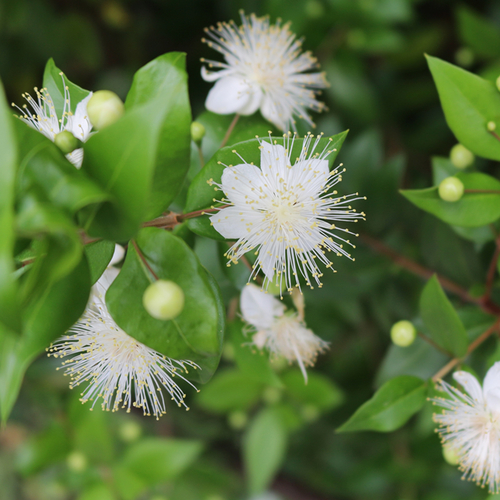
Myrtle
Scientific names: Myrtus communis
Family: Myrtaceae
Alternate names: Aas, A'as, Arrayán, Common Myrtle, Habbal-Aas, Habb-Ul-Aas, Herbe du Lagui, Mirto, Mourd, Murta, Myrte, Myrte Commun, Myrti Aetheroleum, Myrti Folium, Nerte, Roman Myrtle, True Myrtle
Background
Myrtle (Myrtus communis) is a shrub commonly found in Iran. The fruit, leaves, and branches are used in traditional Persian medicine.
Myrtle contains chemicals that might help fight against fungus and bacteria, and reduce swelling.
People use myrtle for acne, canker sores, abnormally heavy bleeding during menstrual periods, persistent heartburn, warts, and many other conditions, but there is no good scientific evidence to support these uses.
Don't confuse myrtle with periwinkle, which is sometimes called myrtle. These are not the same.
Myrtle contains chemicals that might help fight against fungus and bacteria, and reduce swelling.
People use myrtle for acne, canker sores, abnormally heavy bleeding during menstrual periods, persistent heartburn, warts, and many other conditions, but there is no good scientific evidence to support these uses.
Don't confuse myrtle with periwinkle, which is sometimes called myrtle. These are not the same.
Safety Safety definitions
When taken by mouth: Myrtle berry is possibly safe when used short-term. But undiluted myrtle leaf oil is likely unsafe. Myrtle leaf contains a chemical that can cause serious breathing problems and other side effects. There isn't enough reliable information available to know if myrtle leaf, myrtle branch, or myrtle berry extract are safe or what the side effects might be.
When applied to the skin: Diluted myrtle leaf extract is possibly safe. Side effects might include skin irritation and dryness.
When applied to the vagina: Diluted myrtle leaf extract is possibly safe when used in vaginal suppositories, short-term.
Children: Myrtle leaf oil is likely unsafe when taken by mouth in children. Even slight facial contact with the oil can cause breathing problems and death in infants and small children. There isn't enough information available to know if other forms of myrtle are safe to take by mouth or apply to the skin in children.
When applied to the skin: Diluted myrtle leaf extract is possibly safe. Side effects might include skin irritation and dryness.
When applied to the vagina: Diluted myrtle leaf extract is possibly safe when used in vaginal suppositories, short-term.
Special Precautions & Warnings:
Pregnancy and breast-feeding: Myrtle is likely unsafe when taken by mouth while pregnant or breast-feeding. Avoid use.Children: Myrtle leaf oil is likely unsafe when taken by mouth in children. Even slight facial contact with the oil can cause breathing problems and death in infants and small children. There isn't enough information available to know if other forms of myrtle are safe to take by mouth or apply to the skin in children.
Effectiveness
Effective Effectiveness definitions
There is interest in using myrtle for a number of purposes, but there isn't enough reliable information to say whether it might be helpful.
Dosing & administration
There isn't enough reliable information to know what an appropriate dose of myrtle might be. Keep in mind that natural products are not always necessarily safe and dosages can be important. Be sure to follow relevant directions on product labels and consult a healthcare professional before using.
Interactions with pharmaceuticals
It is not known if Myrtle interacts with any medicines. Before taking Myrtle, talk with your healthcare professional if you take any medications.
Interactions with herbs & supplements
There are no known interactions with herbs and supplements.
Interactions with foods
There are no known interactions with foods.
vital.ly has licensed monographs from TRC Healthcare.
This monograph was last reviewed on 16/05/2025 10:00:00 and last updated on 20/01/2022 09:27:41. Monographs are reviewed and/or updated multiple times per month and at least once per year.
Natural Medicines disclaims any responsibility related to medical consequences of using any medical product. Effort is made to ensure that the information contained in this monograph is accurate at the time it was published. Consumers and medical professionals who consult this monograph are cautioned that any medical or product related decision is the sole responsibility of the consumer and/or the health care professional. A legal License Agreement sets limitations on downloading, storing, or printing content from this Database. No reproduction of this monograph or any content from this Database is permitted without written permission from the publisher. It is unlawful to download, store, or distribute content from this site.




